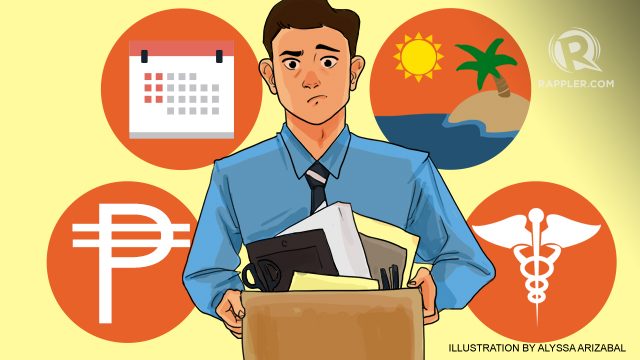SUMMARY
This is AI generated summarization, which may have errors. For context, always refer to the full article.

MANILA, Philippines – So you’ve been contemplating long and hard about leaving your job, and you finally did (READ: The 4 Undeniable Signs that it’s time to quit your job).
But did you think about the consequences of leaving, too? The most basic area to consider for job hunters or jobless people is their ability to finance the “gap months” when the once steady supply of income begins to stop.
You may have all the right reasons to leave, but are you leaving at the right time and with the right amount of savings? Have you considered all the financial consequences that may affect you once you quit your job?
Don’t leave yet if you’re not supposed to leave. Here’s a checklist that may help you think twice, or three times before you start cleaning out your desk.
Are you assured with a new job once you leave?
While most companies have a one- to three-month notification policy for resignations, this is not enough for your job hunting time that might take 3 to 6 months. Yes, it takes THAT amount of time folks. Trust me, during your job hunting process, you will be half of the time underqualified for a position that you like, or overqualified for a position that you will easily spot.
This should be a red flag for your wallet especially if you can’t afford to be jobless for more than a month. Job hunting is more challenging in dense cities thanks to the oversupply of workers that end up competing fiercely with each other (yes Metro Manila, you’re one of them).
Just like dating, it takes patience to find the right one, and the one that will call you back.
Don’t let your emotions take you over. Wait for a bit and only hand in that resignation letter when you have finally signed the employment contract of your next company – the only concrete proof that you’re on someone else’s payroll. Don’t even resign when you’re still in the interview stage, even if you think you nailed it. It’s just too risky.
Also, here’s another reason it makes sense to look for a job when you’re employed: recruiters prefer candidates who are “still in action” to candidates who have been jobless for some time. Research suggests that if you’ve been jobless for 8 months, your chances of being invited for an interview drops by 45% versus someone who’s been jobless for only less than a month.
How much in savings have you kept?
Let’s assume you prefer to “get some well-deserved rest” after you resign. How will you finance that “rest”? Likely, you will pull it out from your savings. But how much in savings did you keep while you were working? More importantly, how much of that savings is liquid (i.e. cold cash, not time deposit or investment-related earnings) that can be easily retrieved anytime from the bank in case of emergency?
Finance experts recommend that you compute your “safety net” money for being jobless by multiplying your monthly salary 6 times, or up to 12 times if you have a #yolo lifestyle.
This amount should be able to cover emergency expenses and the unforeseen extra time you need should you be challenged to find a new job. The worst situation you don’t want to end up with is to go bankrupt and shamefully start borrowing from parents or friends.
One of the top reasons why people end up getting a new job that they didn’t want, or a job that pays less, is because they have no choice but to finally get one since they’ve run out of money.

Are you willing to let go of your company perks and benefits?
Quitting your job doesn’t only mean letting go of your monthly salary. When it comes to compensation, cash isn’t the only king.
Think deeply of non-cash benefits that you will let go: your company phone that gives you free calls and internet access, your medical insurance, your free visits to the dentist, your free company car (or free gas for some lucky folks), down to the free cups of coffee you enjoy at the pantry.
They may look negligible at face value, but they surely add up to at least a quarter of your total monthly expenses. These are now YOUR costs that you need to bear once you’re labeled as “unemployed.” This same thing applies when you plan to become self-employed or when you venture out to create your own business.
Before you resign, take some time to quantify these “hidden” costs, and visualize your future self. Seriously, are you ready to live a life without these? If a major health emergency happens to you or your family dependents that requires a six-digit figure payment, how will you finance it?
Do you have friends and loved ones that you can easily turn to? Are you eligible to take a bank loan? Do you have an independent insurance policy that you can alternatively use? Your answer should be yes to at least one of these. Otherwise, you are putting yourself at big risk.
Are you leaving at the right, strategic time?
What time of the year are you officially leaving your office desk? Consider the consequences of leaving during a specific month or quarter as this can affect your spending and job hunting prospects.
- Avoid March to May and November to January in the Philippines as these are the months when the thirteenth- or fourteen-month bonuses are given. If you think you can wait for 30 more days so that you can receive the company bonus, it then makes sense to wait a bit. If you’re months away to celebrating your 5th or 10th year anniversary in the company, you might want to tender only after since many companies reward their employees with loyalty gifts in cash or kind.
- Are you planning to leave by the 3rd and 4th quarter of the year? If you’re also expecting to be hired by another company during the same time, you might be too late for the party. HR departments are conservative to hire at this time because annual budgets are either spent already or close to getting depleted. Companies are likely on freeze hiring mode and prefer to entertain candidates earlier next year. Your chance of getting a new job, no matter how brilliant you are, may not be as easy as you think.
- Finally, think about your spending patterns in the year if you’re a parent or a breadwinner. Don’t put your family at jeopardy by resigning a few months before school starts (say the magic phrase: tuition fees) or right before Christmas festivities happen (imagine all the gift-giving and eating you’ll scrimp on!). Plan ahead and time your resignation during off-peak season for spending in case you are not able to find a job immediately
At the end of the day
Don’t leave before you need to leave. Take the time to look for a new job, use your leaves to attend interviews (and yes, there will be times that you have to sneak out during lunch time), and understand that it takes time to shift.
If you’re expecting to leave in the next 6 to 8 months, start refreshing your LinkedIn profile and submit your resumes as early as now. Don’t wait for two to 3 months – you’ll only end up cramming!
If you’re a budding entrepreneur, continue building and growing your business and only leave when you have a stable customer base, and a solid revenue trajectory. Yes, you will be juggling a crazy work life balance, but we all know by now that to gain means to have pain.
And yes, you will probably be slightly irresponsible as you do this. You will probably write or answer some of your personal business emails at work, you will probably be on leave many times to attend to your start-up, you will probably be slower in submitting reports and presentations because you have another “company” to attend to.
This is normal and you have to balance this emotionally and physically. You will need to manage the risks. But don’t quit unless you’ve put all the puzzle pieces together. Don’t leave before you really need to leave. – Rappler.com
 Jonathan Yabut is the proud Filipino winner of the hit Asian reality TV show, The Apprentice Asia and is currently based in Kuala Lumpur as a marketing director for the Tune Group of Companies. Jonathan is Asia’s leading motivational speaker on topics involving leadership, Gen Y, and career management for Fortune 500 companies. He is also the author of Southeast Asia’s 2015 best-selling motivational book, From Grit to Great In 2014, he founded his marketing consultancy firm, The JY Ventures Consultancy Group. Visit his official website at jonathanyabut.com
Jonathan Yabut is the proud Filipino winner of the hit Asian reality TV show, The Apprentice Asia and is currently based in Kuala Lumpur as a marketing director for the Tune Group of Companies. Jonathan is Asia’s leading motivational speaker on topics involving leadership, Gen Y, and career management for Fortune 500 companies. He is also the author of Southeast Asia’s 2015 best-selling motivational book, From Grit to Great In 2014, he founded his marketing consultancy firm, The JY Ventures Consultancy Group. Visit his official website at jonathanyabut.com
Add a comment
How does this make you feel?
There are no comments yet. Add your comment to start the conversation.